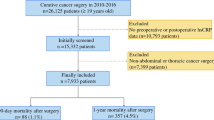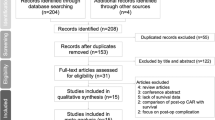Abstract
Recently, we reported that high soluble Hsp70 (sHsp70) level was a significant predictor of mortality during an almost 3-year-long follow-up period in patients with colorectal cancer. This association was the strongest in the group of <70-year-old female patients as well as in those who were in a less advanced stage of the disease at baseline. According to these observations, measurement of the serum level of sHsp70 is a useful, stage-independent prognostic marker in colorectal cancer, especially in patients without distant metastasis. Since many literature data indicated that measurement of C-reactive protein (CRP) and other acute phase proteins (APPs) may also be suitable for predicting the mortality of patients with colorectal cancer, it seemed reasonable to study whether the effect of sHsp70 and other APPs are related or independent. In order to answer this question, we measured the concentrations of CRP as well as of other complement-related APPs (C1 inhibitor, C3, and C9) along with that of the MASP-2 complement component in the sera of 175 patients with colorectal cancer and known levels of sHsp70, which have been used in our previous study. High (above median) levels of CRP, C1 esterase inhibitor (C1-INH), and sHsp70 were found to be independently associated with poor patient survival, whereas no such association was observed with the other proteins tested. According to the adjusted Cox proportional hazards analysis, the additive effect of high sHsp70, CRP, and C1-INH levels on the survival of patients exceeded that of high sHsp70 alone, with a hazard ratio (HR) of 2.83 (1.13–70.9). In some subgroups of patients, such as in females [HR 4.80 (1.07–21.60)] or in ≤70-year-old patients [HR 11.53 (2.78–47.70)], even greater differences were obtained. These findings indicate that the clinical mortality–prediction value of combined measurements of sHsp70, CRP, and C1-INH with inexpensive methods can be very high, especially in specific subgroups of patients with colorectal cancer.


Similar content being viewed by others
References
Allin KH, Bojesen SE, Nordestgaard BG (2009) Baseline C-reactive protein is associated with incident cancer and survival in patients with cancer. J Clin Oncol 27(13):2217
Balkwill F, Mantovani A (2001) Inflammation and cancer: back to Virchow? Lancet 357(9255):539
Baron JA, Cole BF, Sandler RS, Haile RW, Ahnen D, Bresalier R, McKeown-Eyssen G, Summers RW, Rothstein R, Burke CA, Snover DC, Church TR, Allen JI, Beach M, Beck GJ, Bond JH, Byers T, Greenberg ER, Mandel JS, Marcon N, Mott LA, Pearson L, Saibil F, van Stolk RU (2003) A randomized trial of aspirin to prevent colorectal adenomas. N Engl J Med 348(10):891
Biro L, Varga L, Par A, Nemesanszky E, Csepregi A, Telegdy L, Ibranyi E, David K, Horvath G, Szentgyorgyi L, Nagy I, Dalmi L, Abonyi M, Fust G, Horanyi M (2000) Changes in the acute phase complement component and IL-6 levels in patients with chronic hepatitis C receiving interferon alpha-2b. Immunol Lett 72(2):69
Calderwood SK, Theriault JR, Gong J (2005) Message in a bottle: role of the 70-kDa heat shock protein family in anti-tumor immunity. Eur J Immunol 35(9):2518
Coussens LM, Werb Z (2002) Inflammation and cancer. Nature 420(6917):860
Derzsy Z, Prohaszka Z, Rigo J Jr, Fust G, Molvarec A (2010) Activation of the complement system in normal pregnancy and preeclampsia. Mol Immunol 47(7–8):1500
Dybdahl B, Wahba A, Lien E, Flo TH, Waage A, Qureshi N, Sellevold OF, Espevik T, Sundan A (2002) Inflammatory response after open heart surgery: release of heat-shock protein 70 and signaling through toll-like receptor-4. Circulation 105(6):685
Dybdahl B, Slordahl SA, Waage A, Kierulf P, Espevik T, Sundan A (2005) Myocardial ischaemia and the inflammatory response: release of heat shock protein 70 after myocardial infarction. Heart 91(3):299
Eaden JA, Abrams KR, Mayberry JF (2001) The risk of colorectal cancer in ulcerative colitis: a meta-analysis. Gut 48(4):526
Flohe SB, Bangen JM, Flohe S, Agrawal H, Bergmann K, Schade FU (2007) Origin of immunomodulation after soft tissue trauma: potential involvement of extracellular heat-shock proteins. Shock 27(5):494
Greene FL (2007) Current TNM staging of colorectal cancer. Lancet Oncol 8(7):572
Ishizuka M, Nagata H, Takagi K, Kubota K (2009) Influence of inflammation-based prognostic score on mortality of patients undergoing chemotherapy for far advanced or recurrent unresectable colorectal cancer. Ann Surg 250(2):268
Kocsis J, Madaras B, Toth EK, Fust G, Prohaszka Z (2010) Serum level of soluble 70-kD heat shock protein is associated with high mortality in patients with colorectal cancer without distant metastasis. Cell Stress Chaperones 15(2):143
Koike Y, Miki C, Okugawa Y, Yokoe T, Toiyama Y, Tanaka K, Inoue Y, Kusunoki M (2008) Preoperative C-reactive protein as a prognostic and therapeutic marker for colorectal cancer. J Surg Oncol 98(7):540
Kotler DP (2000) Cachexia. Ann Intern Med 133(8):622
Molvarec A, Prohaszka Z, Nagy B, Szalay J, Fust G, Karadi I, Rigo J Jr (2006) Association of elevated serum heat-shock protein 70 concentration with transient hypertension of pregnancy, preeclampsia and superimposed preeclampsia: a case-control study. J Hum Hypertens 20(10):780
Molvarec A, Rigo J Jr, Lazar L, Balogh K, Mako V, Cervenak L, Mezes M, Prohaszka Z (2009) Increased serum heat-shock protein 70 levels reflect systemic inflammation, oxidative stress and hepatocellular injury in preeclampsia. Cell Stress Chaperones 14(2):151
Newcomb PA, Storer BE (1995) Postmenopausal hormone use and risk of large-bowel cancer. J Natl Cancer Inst 87(14):1067
Nozoe T, Matsumata T, Sugimachi K (2000) Preoperative elevation of serum C-reactive protein is related to impaired immunity in patients with colorectal cancer. Am J Clin Oncol 23(3):263
Nozoe T, Mori E, Takahashi I, Ezaki T (2008) Preoperative elevation of serum C-reactive protein as an independent prognostic indicator of colorectal carcinoma. Surg Today 38(7):597
Pittet JF, Lee H, Morabito D, Howard MB, Welch WJ, Mackersie RC (2002) Serum levels of Hsp 72 measured early after trauma correlate with survival. J Trauma 52(4):611
Satoh M, Shimoda Y, Akatsu T, Ishikawa Y, Minami Y, Nakamura M (2006) Elevated circulating levels of heat shock protein 70 are related to systemic inflammatory reaction through monocyte toll signal in patients with heart failure after acute myocardial infarction. Eur J Heart Fail 8(8):810
Szeplaki G, Varga L, Laki J, Dosa E, Rugonfalvi-Kiss S, Madsen HO, Prohaszka Z, Kocsis A, Gal P, Szabo A, Acsady G, Karadi I, Selmeci L, Garred P, Fust G, Entz L (2007) Low c1-inhibitor levels predict early restenosis after eversion carotid endarterectomy. Arterioscler Thromb Vasc Biol 27(12):2756
Varga L, Szeplaki G, Laki J, Kocsis A, Kristof K, Gal P, Bajtay Z, Wieslander J, Daha MR, Garred P, Madsen HO, Fust G, Farkas H (2008) Depressed activation of the lectin pathway of complement in hereditary angioedema. Clin Exp Immunol 153(1):68
Wang CS, Sun CF (2009) C-reactive protein and malignancy: clinico-pathological association and therapeutic implication. Chang Gung Med J 32(5):471
Wright BH, Corton JM, El-Nahas AM, Wood RF, Pockley AG (2000) Elevated levels of circulating heat shock protein 70 (Hsp70) in peripheral and renal vascular disease. Heart Vessels 15(1):18
Ytting H, Christensen IJ, Jensenius JC, Thiel S, Nielsen HJ (2005) Preoperative mannan-binding lectin pathway and prognosis in colorectal cancer. Cancer Immunol Immunother 54(3):265
Ytting H, Christensen IJ, Thiel S, Jensenius JC, Nielsen HJ (2008) Pre- and postoperative levels in serum of mannan-binding lectin associated serine protease-2—a prognostic marker in colorectal cancer. Hum Immunol 69(7):414
Acknowledgements
The present study was supported by the National Research Foundation (OTKA NF 72689).
Author information
Authors and Affiliations
Corresponding author
Rights and permissions
About this article
Cite this article
Kocsis, J., Mészáros, T., Madaras, B. et al. High levels of acute phase proteins and soluble 70 kDa heat shock proteins are independent and additive risk factors for mortality in colorectal cancer. Cell Stress and Chaperones 16, 49–55 (2011). https://doi.org/10.1007/s12192-010-0220-z
Received:
Revised:
Accepted:
Published:
Issue Date:
DOI: https://doi.org/10.1007/s12192-010-0220-z




